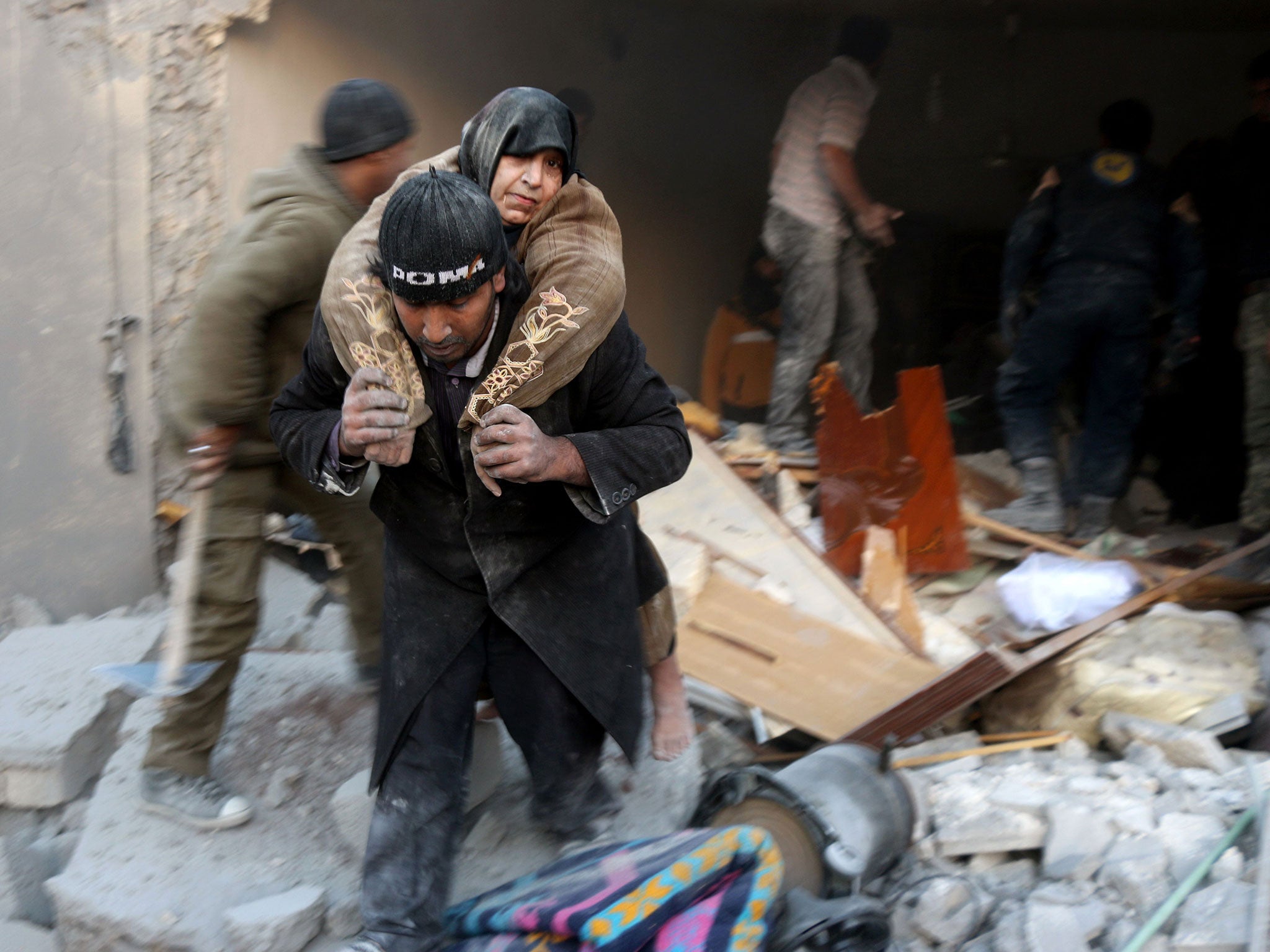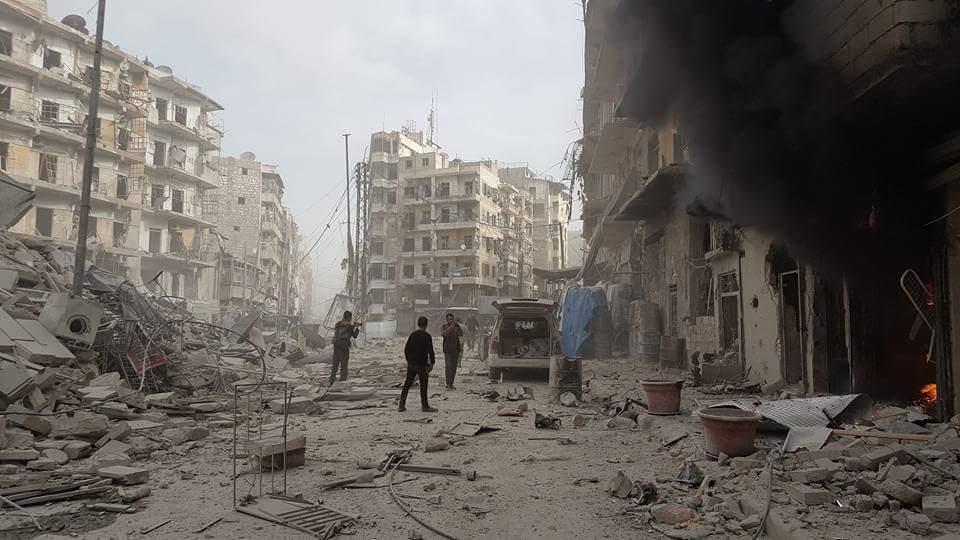Syrian war: Bashar al-Assad's forces advancing on rebel-held Aleppo as hospitals, schools and homes bombed
Violence intensifies after Syrian government rejects proposed UN truce
Your support helps us to tell the story
From reproductive rights to climate change to Big Tech, The Independent is on the ground when the story is developing. Whether it's investigating the financials of Elon Musk's pro-Trump PAC or producing our latest documentary, 'The A Word', which shines a light on the American women fighting for reproductive rights, we know how important it is to parse out the facts from the messaging.
At such a critical moment in US history, we need reporters on the ground. Your donation allows us to keep sending journalists to speak to both sides of the story.
The Independent is trusted by Americans across the entire political spectrum. And unlike many other quality news outlets, we choose not to lock Americans out of our reporting and analysis with paywalls. We believe quality journalism should be available to everyone, paid for by those who can afford it.
Your support makes all the difference.Bashar al-Assad’s forces are advancing on rebel-held Aleppo in a brutal campaign in which schools, homes and hospitals have been bombarded as battles rage in the divided city’s streets.
The United Nations has condemned the Syrian regime’s “horrific” assault but the government and its Russian and Iranian backers have intensified operations that resumed in besieged areas last week.
The UK-based Syrian Observatory for Human Rights said Lebanese Hezbollah fighters were part of units that captured the eastern part of the Masakan Hanano neighbourhood on Monday.

“It is the most important advance inside the eastern neighbourhoods that the regime has made so far,” said director Rami Abdul Rahman.
“If they take control of Masakan Hanano, the regime will have line-of-fire control over several rebel-held neighbourhoods and will be able to cut off the northern parts of rebel-held Aleppo from the rest of the opposition-held districts.”
It was the first district to fall under rebel control as Aleppo fractured in 2012, adding extra symbolism in the battle for what was Syria’s most populous city.
The Al-Watan newspaper, which is close to the government, described the neighbourhood as the “biggest and most important stronghold of the gunmen” holding out against the regime.
Battles raged after President Assad’s government turned down a planned UN truce that would have seen eastern Aleppo temporarily administered by the opposition on the condition that militants left, claiming it would “reward terrorists”.
The UN’s Syria envoy, Staffan de Mistura, left Damascus on Monday with a warning that time was “running out” amid intensifying military operations.

“By Christmas...due to military intensification, you will have the virtual collapse of what is left in eastern Aleppo; you may have 200,000 people moving towards Turkey – that would be a humanitarian catastrophe,” he said.
Government forces have pounded opposition districts with air strikes, barrel bombs and artillery fire since Tuesday last week, killing more than 100 people in recent days according to the observatory’s count.
No aid has entered eastern Aleppo since it came under government siege in July, after a brief incursion by jihadi-led rebels, prompting critical shortages of food, sanitation, fuel and medicine.
On Sunday, Barack Obama said he was “not optimistic about the short-term prospects in Syria” amid concerns his successor will cut support for the opposition.
“Once Russia and Iran made a decision to back Assad in a brutal air campaign...it was very hard to see a way in which even a trained and committed moderate opposition could hold its ground for long periods of time,” he said.
All makeshift hospitals were put out of service by air strikes overnight on Friday, including eastern Aleppo’s largest remaining children’s hospital, which was treating victims of a suspected government chlorine attack when it was hit.

An Al Jazeera camera crew was filming the aftermath of the chemical barrel bombing at the time, showing distressing images of children being given oxygen as they suffocated, before the bombs hit and the power cut.
Screaming families ran for cover as nurses plucked newborn babies from incubators amid the dust and rubble to take them to safety.
Dr Hatem, the director of the children’s hospital, said Syria and its allies were taking advantage of the world’s “distraction”.
“The Friends of Syria countries must take urgent action to use their influence to stop these bombs,” he added. “We cannot believe that the world’s most powerful countries can't stop children’s hospitals being bombed and hundreds of thousands facing starvation.”
Global outrage over civilian deaths in the bloody campaign has done little to halt the advance, with opposition forces losing ground since Vladimir Putin launched Russia’s air campaign in support of the regime last year.
Geert Cappelaere, Unicef’s Middle East and North Africa media director, said at least nine children had been killed in attacks on schools in Aleppo and Ghouta, outside Damascus.
“There are no more working hospitals in eastern Aleppo, where more than 100,000 children are trapped under siege and heavy bombardment with dwindling access to food and medicine,” he said on Monday.
“They need these hospitals to stay alive. Children should not be dying in hospitals because of bombs and they should not be dying in schools.”
Unicef said eight children were killed and many more injured in rebel shelling that hit two schools in regime-controlled western Aleppo, including one where a mortar fell into a playground as a year-four class were practising a dance routine.
At al-Qarma primary school in eastern Ghouta, near Damascus, a girl was reportedly killed and at least 15 injured in a maths class when the building took a direct hit. In Idlib, an additional two schools were hit with three children injured.
The UN has documented 84 attacks on schools across Syria so far in 2016, with at least 69 children losing their lives and many others injured in possible war crimes.
Elsewhere in Syria, conflict continues between Turkey-backed rebels and Kurdish groups supported by the US-led coalition in the fight against Isis.
Adnan Abu Amjad, commander of the Kurdish-aligned Manbij Military Council, said Turkish jets struck his group near the former Isis stronghold of Manbij late on Sunday, killing one fighter and wounding others.
“The Turkish state is a terrorist state that is attacking positions of the military council that is fighting Daesh [Isis],” he said, as President Recep Tayyip Erdogan continues to resist a proposed no-fly zone in the region.
Additional reporting by agencies

Join our commenting forum
Join thought-provoking conversations, follow other Independent readers and see their replies
Comments